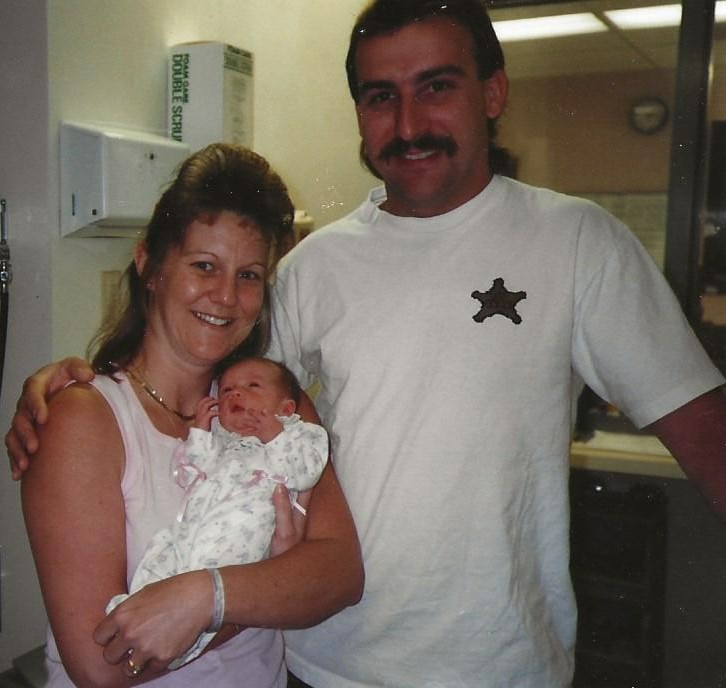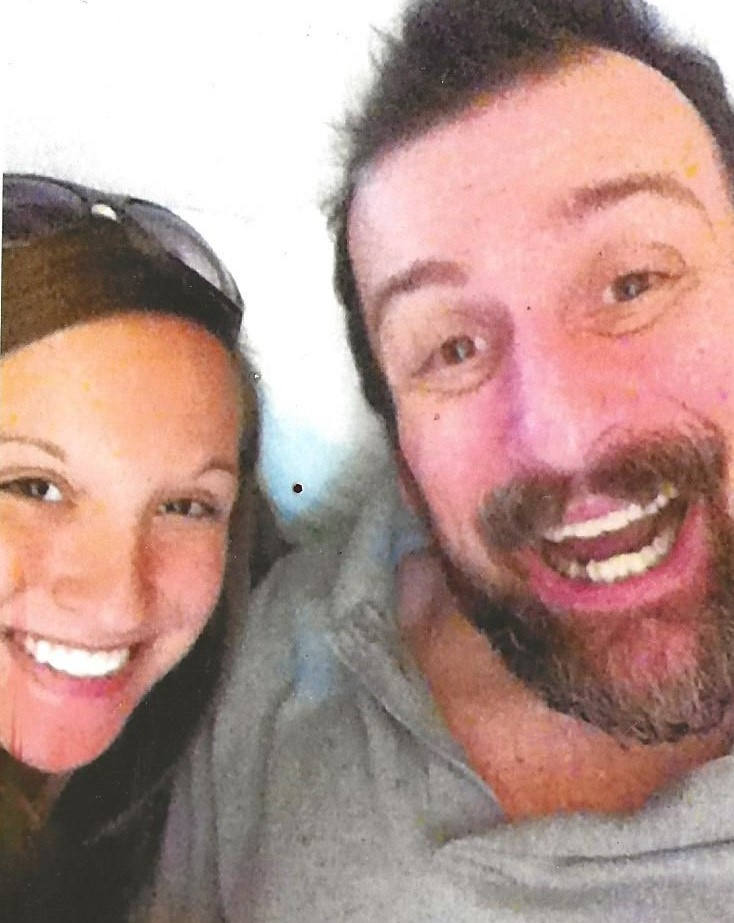
By Matthew Santamaria (msantamaria@hdsa.org)
Missouri resident Jennifer Schultz’s grandparents had four children. When her father was in high school, after a long battle with Huntington's disease (HD), Jennifer’s grandmother passed away.
HD is a fatal genetic disorder that causes the progressive breakdown of nerve cells in the brain. It deteriorates a person’s physical and mental abilities during their prime working years and has no cure. Every child of a parent with HD has a 50/50 chance of inheriting the faulty gene.
The four children would soon learn that they were also at risk. Every child of a parent with HD has a 50/50 chance of inheriting the faulty gene.
“Before I was born, my mother and father wanted to have children but my father was not tested for HD yet,” said Jennifer.

Genetic testing would assist the family’s efforts in determining a positive or negative test result and can be performed on cells from chorionic villus sampling (CVS) and amniocentesis. A woman who is already pregnant can receive testing for the fetus with a CVS at 10-13 weeks. This includes testing on the placenta and the risk of a miscarriage is 1:100. For amniocentesis, beginning in the 15th week of pregnancy, testing can be performed on fetal cells from amniotic fluid. The risk of a miscarriage is 1:500-1:300.
Pre-implantation Genetic Diagnosis (PGD) testing can be used with In Vitro Fertilization (IVF) which makes sure any fertilized egg implanted does not have the abnormal gene. For HD families considering this, it can be a very costly procedure.
Adoption within the United States would allow the family to have access to the child’s history/medical background. There is also the chance of a possible relationship with the child’s biological family. However, the negative side is the waiting times may be long and laws/options vary by state. International Adoption would provide limited access to history/medical information and the placement process varies by country of origin.
Her father decided to get tested for HD.
The decision to get genetically tested is difficult to make. Each year, 5-10% are tested. It is never the right or wrong decision to be tested. There are people that see no benefit in knowing that they will develop the disease while others want to know in order to make informed choices about their future. It can take up to several weeks to receive your results from the genetic testing center.
Unfortunately, he tested positive and Jennifer was now at risk.
“My father and aunt were the only siblings that tested positive in the family,” said Jennifer. “When my dad found out he had HD, he became depressed and drank a lot. My aunt later passed away.”

For non-related HD reasons, her parents later got a divorce. In high school, Jennifer noticed that her father was developing HD-related symptoms.
"His symptoms included twitching, involuntary movements, tripping, losing his driver’s license, trouble eating, losing weight, hair loss, and difficulty in swallowing,” Jennifer explains.
The symptoms of HD are described as having ALS, Parkinson’s, and Alzheimer’s – simultaneously. Symptoms include personality changes, mood swings, depression, forgetfulness, impaired judgment, unsteady gait, involuntary movements, slurred speech, difficulty in swallowing, and significant weight loss.
As his symptoms progressed, he was placed in a nursing home.
"He was unable to physically go to my college graduation but I showed him all the photos,” said Jennifer.
One month later, Jennifer’s father passed away.

“I think he survived longer than anyone else in the family with HD because of me,” Jennifer explains.
Jennifer graduated with a degree in nanoscale biology and also completed her masters in the same field. She decided on nanoscale biology because she wants to find cures for neurological diseases including HD.
Jennifer wants to help people affected by HD. She has attended local HD awareness events.
As for her HD future, Jennifer has decided not to get tested.
"I want to avoid what my father went through in his HD battle,” said Jennifer.
Jennifer has a message for the HD Community:
“Pray, hope, and don’t worry.”
###
Huntington’s disease (HD) is a fatal genetic disorder that causes the progressive breakdown of nerve cells in the brain. It deteriorates a person’s physical and mental abilities during their prime working years and has no cure. Every child of a parent with HD has a 50/50 chance of inheriting the faulty gene. Today, there are approximately 41,000 symptomatic Americans and more than 200,000 at-risk of inheriting the disease. The symptoms of HD are described as having ALS, Parkinson’s and Alzheimer’s – simultaneously.
The Huntington’s Disease Society of America is the premier nonprofit organization dedicated to improving the lives of everyone affected by HD. From community services and education to advocacy and research, HDSA is the world’s leader in providing help for today and hope for tomorrow for people with HD and their families.
HDSA was founded in 1967 by Marjorie Guthrie, the wife of legendary folk singer Woody Guthrie. Woody died from HD complications when he was only 55 years old, but the Guthrie family legacy lives on at HDSA to this day.
To learn more about Huntington’s disease and the work of the Huntington’s Disease Society of America, visit www.HDSA.org or call 1(800)345-HDSA.
This is a story featuring a personal experience with Huntington’s disease. If you would like to have your story told please contact Matthew Santamaria at msantamaria@hdsa.org
Missouri resident Jennifer Schultz’s grandparents had four children. When her father was in high school, after a long battle with Huntington's disease (HD), Jennifer’s grandmother passed away.
HD is a fatal genetic disorder that causes the progressive breakdown of nerve cells in the brain. It deteriorates a person’s physical and mental abilities during their prime working years and has no cure. Every child of a parent with HD has a 50/50 chance of inheriting the faulty gene.
The four children would soon learn that they were also at risk. Every child of a parent with HD has a 50/50 chance of inheriting the faulty gene.
“Before I was born, my mother and father wanted to have children but my father was not tested for HD yet,” said Jennifer.

Genetic testing would assist the family’s efforts in determining a positive or negative test result and can be performed on cells from chorionic villus sampling (CVS) and amniocentesis. A woman who is already pregnant can receive testing for the fetus with a CVS at 10-13 weeks. This includes testing on the placenta and the risk of a miscarriage is 1:100. For amniocentesis, beginning in the 15th week of pregnancy, testing can be performed on fetal cells from amniotic fluid. The risk of a miscarriage is 1:500-1:300.
Pre-implantation Genetic Diagnosis (PGD) testing can be used with In Vitro Fertilization (IVF) which makes sure any fertilized egg implanted does not have the abnormal gene. For HD families considering this, it can be a very costly procedure.
Adoption within the United States would allow the family to have access to the child’s history/medical background. There is also the chance of a possible relationship with the child’s biological family. However, the negative side is the waiting times may be long and laws/options vary by state. International Adoption would provide limited access to history/medical information and the placement process varies by country of origin.
Her father decided to get tested for HD.
The decision to get genetically tested is difficult to make. Each year, 5-10% are tested. It is never the right or wrong decision to be tested. There are people that see no benefit in knowing that they will develop the disease while others want to know in order to make informed choices about their future. It can take up to several weeks to receive your results from the genetic testing center.
Unfortunately, he tested positive and Jennifer was now at risk.
“My father and aunt were the only siblings that tested positive in the family,” said Jennifer. “When my dad found out he had HD, he became depressed and drank a lot. My aunt later passed away.”

For non-related HD reasons, her parents later got a divorce. In high school, Jennifer noticed that her father was developing HD-related symptoms.
"His symptoms included twitching, involuntary movements, tripping, losing his driver’s license, trouble eating, losing weight, hair loss, and difficulty in swallowing,” Jennifer explains.
The symptoms of HD are described as having ALS, Parkinson’s, and Alzheimer’s – simultaneously. Symptoms include personality changes, mood swings, depression, forgetfulness, impaired judgment, unsteady gait, involuntary movements, slurred speech, difficulty in swallowing, and significant weight loss.
As his symptoms progressed, he was placed in a nursing home.
"He was unable to physically go to my college graduation but I showed him all the photos,” said Jennifer.
One month later, Jennifer’s father passed away.

“I think he survived longer than anyone else in the family with HD because of me,” Jennifer explains.
Jennifer graduated with a degree in nanoscale biology and also completed her masters in the same field. She decided on nanoscale biology because she wants to find cures for neurological diseases including HD.
Jennifer wants to help people affected by HD. She has attended local HD awareness events.
As for her HD future, Jennifer has decided not to get tested.
"I want to avoid what my father went through in his HD battle,” said Jennifer.
Jennifer has a message for the HD Community:
“Pray, hope, and don’t worry.”
###
Huntington’s disease (HD) is a fatal genetic disorder that causes the progressive breakdown of nerve cells in the brain. It deteriorates a person’s physical and mental abilities during their prime working years and has no cure. Every child of a parent with HD has a 50/50 chance of inheriting the faulty gene. Today, there are approximately 41,000 symptomatic Americans and more than 200,000 at-risk of inheriting the disease. The symptoms of HD are described as having ALS, Parkinson’s and Alzheimer’s – simultaneously.
The Huntington’s Disease Society of America is the premier nonprofit organization dedicated to improving the lives of everyone affected by HD. From community services and education to advocacy and research, HDSA is the world’s leader in providing help for today and hope for tomorrow for people with HD and their families.
HDSA was founded in 1967 by Marjorie Guthrie, the wife of legendary folk singer Woody Guthrie. Woody died from HD complications when he was only 55 years old, but the Guthrie family legacy lives on at HDSA to this day.
To learn more about Huntington’s disease and the work of the Huntington’s Disease Society of America, visit www.HDSA.org or call 1(800)345-HDSA.
This is a story featuring a personal experience with Huntington’s disease. If you would like to have your story told please contact Matthew Santamaria at msantamaria@hdsa.org
